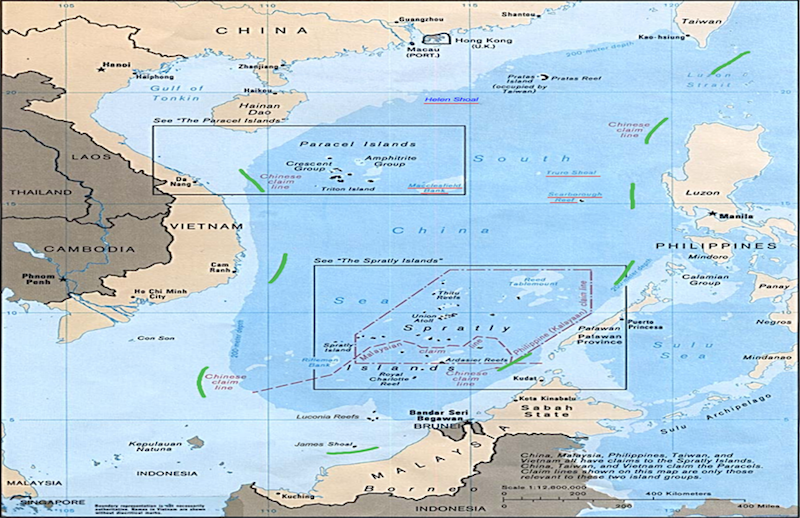Government should stand up vs Chinese gray zone operations, engage in united response with allies, experts say
In response to Chinese aggression in the West Philippine Sea, experts urge the government to engage in collective deterrence with like-minded allies.
Stratbase ADR Institute, in partnership with Konrad-Adenauer-Stiftung Philippines, organized a forum on gray zone operations in the maritime Indo-Pacific on Wednesday, which included national security experts, maritime law experts, and geopolitical experts.

As stated by CG Commo Jay Tarriola, Adviser of the Commandant for Maritime Security, Philippine Coast Guard, the most important role of the Coast Guard in recent weeks has been to remove the shades of gray and expose either black or white.
As a result of the Philippine Coast Guard’s persistent presence in contested waters while documenting Chinese activities, the international community has been criticized for its (China’s) violations of international law and international rules-based order, CG Tarriola said.
Chinese operations in the West Philippine Sea are now becoming “more and more clearly hostile and aggressive”, according to maritime law expert Professor Jay Batongbacal.
It was just last month that the Chinese Coast Guard fired a laser beam at a Philippine Coast Guard ship in Ayungin Shoal. Within the surrounding waters of the Pag-asa island, the PCG reported 42 suspected Chinese Maritime Militia vessels, including a People’s Liberation Army Navy vessel, a China Coast Guard vessel, and a Chinese Coast Guard vessel.
Batongbacal urged the government to prepare reasonable and proportionate responses to China’s threats and activities against Filipinos in the West Philippine Sea.
We should not be afraid to consider proportionate and reasonable responses. We should not retreat every time they make threatening moves, fearing provocation… There should no longer be any gray area. We need to start erasing the gray zone. We need to begin acting and standing up for our lawful maritime rights. Otherwise, we might as well retreat and give up everything,” he explained.
The government should coordinate with allies and engage in collective deterrence against Chinese aggression, Batongbacal said.
We should not only be on our own for the planning and responses to China’s gray zone activities. We ought to work in conjunction with our allies and friends to carry out collective deterrence. By coordinating and syncing our strategies, policies, and responses, we will be able to send a clear message that these antics are no longer feasible because of a unified front.
Dindo Manhit, president of Stratbase, also urged the current administration to cooperate with like-minded states through joint patrols and maritime domain awareness.
“The Philippines and other Indo-Pacific states must devise strategies to change China’s behavior so that it is aligned with the internationally established rules-based order,” Manhit said. “Instead of coercion, states should strengthen bilateral, multilateral, and minilateral cooperation.”
As a result of its expansionist ambitions and militarization, China’s activities within Philippine territory cannot be allowed. The activities include swarming their fishing and militia vessels in our territory, obstructing our resupply missions, tailing scientific vessels, and pointing military-grade lasers at our Coast Guard. This aggression cannot be allowed to continue, he said.
Renato De Castro, a professor of International Studies, said an emerging threat requires counterbalancing.
To limit China’s ability to conduct grey zone operations against the Philippines, Manila, Washington, Canberra, and Tokyo must demonstrate a strong commitment to mutual assistance through security agreements, troop deployments, arms transfers, and multinational exercises, thereby reducing the Philippines’ sense of insecurity,” De Castro explained.
In addition, he recommended developing a surveillance system to continuously monitor Chinese gray operations.
“This requires the development of a regional surveillance network that can detect, identify, and monitor Chinese vessels positioned for grey zone operations in the West Philippine Sea,” de Castro noted.
“The Duterte Administration has realized the importance of its alliance with the U.S., ” de Castro said, citing how the Philippine government has changed its stance on China’s gray zone activities. Despite the diplomatic rapprochement with China, the Chinese Coast Guard and Chinese maritime militias continued their coercive actions against Philippine military units and Filipino fishermen in the South China Sea.”
The Gordian Knot Center for National Security Innovation Fellow, retired Col. To deter Chinese gray zone activities, Raymond Powell advised the government to engage the public, engage independent analysts, storytellers, influencers, and the media, and utilize commercially available maritime data.
As Powell noted, “Exposure is key to deterring and building resilience against gray zone activities in the Indo-Pacific.” However, he points out, “Governments hold the best gray zone information, but face barriers to release it.”
It is Powell’s recommendation to “light up the maritime gray zone” by allowing credible independent analysts, influencers, and media access to commercially available maritime data. To help monitor, document, and disseminate the gray zone activities occurring in the West Philippine Sea, he suggested embedding journalists in coast guard vessels.
“Deterring gray zone actors and building national resilience require an engaged public,” Powell said.
